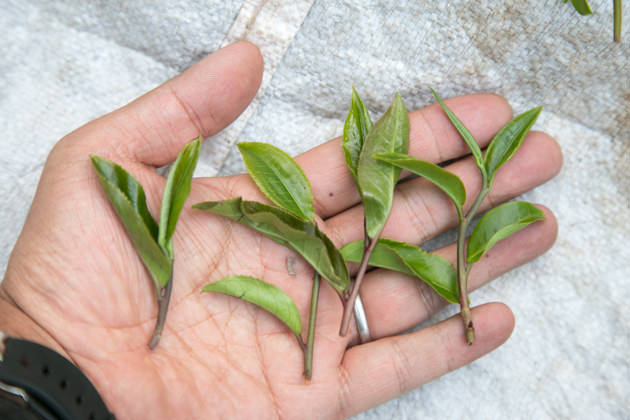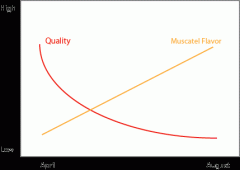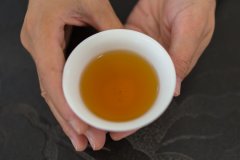What is the taste of Yunnan black tea? Is black tea expensive in mountain purple tea in Yunnan, China?
Why can high altitude produce good tea? All the time, we humans inhale oxygen and release carbon dioxide. As for plants, there are two different ways. During the day, plants absorb carbon dioxide and release oxygen. They carry out photosynthesis and produce energy and other components. Instead, plants absorb oxygen and release carbon dioxide at night, just like we do. At night, plants consume the energy they produce during the day and try to grow. In other words, factories are manufacturers during the day and consumers at night. At higher elevations, the temperature drops sharply at night and the oxygen concentration is also very low. In this case, plants are forced to slow down their metabolism so that they cannot consume the substances produced during the day. Therefore, plants contain more ingredients, making the taste of tea thicker and richer. When it comes to Phoenix oolong tea or Yunnan tea, we are very concerned about altitude. The tea at high altitude has a smooth and layered taste. However, once nitrogen fertilizer is applied, the growth rate of tea plants will be accelerated. As a result, the taste of tea becomes thin, and the alpine characteristics of tea are obviously reduced. Even in Yunnan, this kind of tea is very rare among Pu'er tea lovers. It is well known that purple tea originated from Nannuoshan in southern Yunnan. Its leaves are purple in color and its taste is very astringent. After some efforts by the Yunnan Tea Research Institute, they developed a new variety called Zijuan Zichang Tea (Purple Silk Tea in China), which can greatly reduce astringency. On the other hand, our alpine purple tea varieties are completely different. This kind of tea is not purple cuckoo tea.

As far as I know, this kind of tea only appears in very specific areas of Lincang. It is said that it used to be one of the wild tea varieties. So far, I have only seen this special species near the Burmese border, such as in Zhenkang or Yongde County. It is common in areas with extremely high elevations (> 1800 m). The color of tea is not really purple, except that the stem is partly purple. Interestingly, once this kind of tea is processed into Pu'er tea, it will turn dark blue. This purple tea in Lincang is completely different from the purple tea in southern Yunnan. They just happen to be called by the same name. Alpine purple black tea has no astringency at all. The palate is very soft and full, with a strong finish. As the producing area of alpine purple tea is very limited, and most of it is distributed in mountain villages, apart from Pu'er tea, this kind of tea has never been processed into other tea. A few years ago, a tea merchant said that he had tried black tea made from alpine purple tea. According to him, it was made on a small scale by his friends. He told me that its taste and taste were impressive. After learning about his experience, I became very interested in making my own black tea with alpine purple tea. Tea is planted at an altitude of 2000 meters above sea level. The tea garden is located above 2000 meters. Such tea gardens do not use pesticides or fertilizers. Tea trees naturally grow in a balanced ecological environment. Once you taste this tea, you may notice the taste of cream, which is a typical characteristic of Gaoshan tea. Sweet taste like peach and sweet potato this purple black tea uses high-quality raw materials collected in early spring, the taste is very soft, not bitter, not sour, not astringent. Even if you drink this kind of tea on an empty stomach, there is no problem. For the same reason, children also like this kind of tea. The taste of alpine purple black tea is very unique. The sweet taste reminds me of peaches, nectarines, marigolds, sweet potatoes and dried sweet potatoes. This tea is full-bodied and has a strong aftertaste. Its sweetness stayed on the taste buds for a long time. It goes well with milk, too.
Important Notice :
前街咖啡 FrontStreet Coffee has moved to new addredd:
FrontStreet Coffee Address: 315,Donghua East Road,GuangZhou
Tel:020 38364473
- Prev

How is the flower and fruit aroma of black tea made? What kind of high-flavor Yunnan musk Yunnan black tea tastes good?
The musk flavor of Yunnan black tea is not as strong as that of honey-scented black tea from Taiwan. Both teas exude a hint of musk grape flavor, enhancing the overall characteristics of the tea. In fact, when I was traveling in Yunnan in early April, I also found some black tea with a stronger musk grape flavor. However, tea
- Next

Can I drink tea overnight? What harm does drinking do to your health? You can't drink tea after brewing it several times.
When making tea, sometimes you stop brewing tea once or twice. We often wonder whether we should continue to brew it. Sometimes we may think that brewing methods, such as kung fu brewing or traditional Chinese brewing, or even the type of teapot, will determine how long the tea can be kept fresh to how many times. In my opinion, at the same time
Related
- Unexpected! Ruixing Telunsu lattes use a smoothie machine to foam milk?!
- % Arabia's first store in Henan opens into the village?! Netizen: Thought it was P's
- Does an authentic standard mocha coffee recipe use chocolate sauce or powder? Mocha Latte/Dirty Coffee/Salty Mocha Coffee Recipe Share!
- What is the difference between Vietnam egg coffee and Norway egg coffee? Hand-brewed single product coffee filter paper filter cloth filter flat solution!
- What is the difference between sun-cured and honey-treated coffee? What are the differences in the flavor characteristics of sun-honey coffee?
- How to make Italian latte! How much milk does a standard latte use/what should the ratio of coffee to milk be?
- How to make butter American/butter latte/butter Dirty coffee? Is hand-brewed coffee good with butter?
- Is Dirty the cold version of Australian White? What is the difference between dirty coffee/decent coffee and Australian white espresso?
- Relationship between brewing time and coffee extraction parameters How to make the brewing time fall to 2 minutes?
- Got entangled?! Lucky opens a new store, Mixue Ice City, and pursues it as a neighbor!

